- Home
- Virginia Kantra
Home Before Midnight Page 4
Home Before Midnight Read online
Page 4
“Gabby?” His mother’s voice carried from the kitchen. “Who is it?”
Steve took a deep breath and followed his daughter down the hall. “It’s me, Mom. I’m home.”
“About time, too,” his mother said.
Eugenia Burke was one of those Southern women who would look the same at seventy as she did at fifty-five, her body kept toned by exercise and her mind kept sharp by an interest in everything and everybody. As far back as Steve could remember, her hair was sleek and dark, her complexion moisturized, and her toenail polish pink. The death of Steve’s father five years ago had hit her hard, but her life since then had settled into a routine of book club, Bible study, and volunteer work at the hospital.
At the time, Steve had figured Eugenia was filling the void left by her husband’s death. Now he knew some chasms could never be filled. Eugenia had simply stepped back from the edge.
She slid a plate into the microwave and turned to face him. “I suppose it’s too much to hope you were out all night on a date.”
Steve crossed the sunlit kitchen to the coffeepot, refusing to rise to her bait. She knew where he’d been. He’d left a note. But he and Gabby had barely moved in when Mom took it into her head it was time he started dating agin, and now she never lost an opportunity to remind him he wasn’t getting any younger and there were plenty of nice girls in Stokesville. “I was out on a call.”
Eugenia nodded, momentarily distracted from her campaign to mend his broken heart and secure more grandchildren. “Helen Stokes. Bless her heart.”
Steve raised his eyebrows, arrested in the act of pouring. “How did you hear about that?”
“Judith Griggs—you remember Judith, from the book club?—lives right down the street from the Stokes place. She saw the lights last night, and then the yellow tape this morning. She went over with a pan of her monkey bread, because that Paul Ellis is supposed to speak to the book club next month, and she was afraid maybe something had happened to him. But it was Helen.” Eugenia took a plate of French toast and bacon out of the microwave and set it on the counter in front of Steve. “So, what happened?”
Steve looked down at the plate and then up at his mother. “Attempting to bribe a law enforcement officer, Ma?” he asked dryly.
“Certainly not,” Eugenia said, blushing.
“Good.” All he wanted was hot coffee, a cold shower, and a couple of extra strength Tylenol. But he went through the motions. You had to go through the motions. He dumped syrup over his plate. “Thanks for breakfast.”
“Is somebody dead?” Gabrielle asked.
Shit. If he’d had any appetite, that would have killed it.
“A neighbor lady, honey,” his mother replied. “Nobody you know.”
Gabrielle’s dark gaze fixed on her father’s face. “Was she sick?”
Teresa had been sick. Ovarian cancer. Two short months, while Steve begged and threatened and cajoled and raged, and then she died.
“Not sick,” he said.
“An accident?” Eugenia asked.
“Looks like it.”
It looked like . . . trouble.
Steve had no witness, no weapon, no visible bloodstains, nothing to suggest homicide. Only a prickling under his skin, like a numb leg twitching to painful life, and a memory of skinny Bailey Wells with her arms around Paul Ellis.
Something stirred in Steve’s belly. Anger, maybe.
He scowled into his cup. He wasn’t emotionally involved. He didn’t want to be emotionally involved. Compartmentalize. Depersonalize. Detach.
Eugenia ran water over the frying pan in the sink. “Dotty’s going to want Bailey out of there now, you mark my words.”
Steve set down his mug. There was a daughter in Atlanta who needed to be notified—Regan. And an estranged son, Richard, in Chicago. “Who’s Dotty?”
“Dorothy Wells. Her daughter Bailey works for Helen’s husband.”
Well, hell.
“She told me she was from New York,” Steve said slowly.
“She may be. But her family’s right here in Stokesville.”
“Why don’t I remember her?”
“She’s a whole lot younger than you,” Eugenia said frankly. “Ten years at least. I’ll bet you remember her sister, though. Leann Wells?”
“Nope.”
“Beautiful girl,” his mother said. “But she’s married now. To Bryce Edwards. He sells insurance, I think.”
He let her talk. He needed to know his territory, to re-learn the fabric of town life so he could see the patterns and the pieces out of place. You never knew when some tidbit dropped in friendly conversation, in the checkout line or over coffee, could become the connecting thread in a crime.
Eugenia glanced over her shoulder. “So you talked to her? Bailey?”
He remembered Bailey’s thin, pale face, her shock-dilated pupils, her unnatural composure. Her hands on the back of Ellis’s shirt. He hadn’t missed her initial stiffness when her boss grabbed her . . . or her awkward softening. He just didn’t know what to make of it yet.
“She was at the scene. Of course I talked to her.”
“How is she taking it?”
“I’d say pretty well.” He watched Eugenia dry her hands on a towel, his mind turning over. “So, Dorothy Wells doesn’t approve of her daughter’s living arrangements?”
“Steven Burke.” Eugenia pursed her mouth. “Are you attempting to pump your own mama for information?”
He lifted his eyebrows. The question was payback, he knew, for his earlier crack about bribing him with breakfast. “What are you talking about?”
“Yeah, what are you talking about?” Gabrielle asked from beside him.
She was growing, he realized with a pang, pierced ears, ragged nails and all. Her head was level with his shoulder.
He put an arm around her. “Nothing important. What are you up to today?”
Her shoulders hunched, dislodging his arm. “I don’t know.”
He watched her slide away along the counter. “You want to go to the movies, invite a friend?”
“I don’t have any friends here,” she said. Not sulky, but with the exaggerated patience she’d adopted recently.
Eugenia turned away, busying herself arranging the towel over the bar on the oven door. Letting him deal with it.
Steve’s pulse banged behind his eyeballs. “Well,” he said cautiously. “It’s summer. You’ll make new friends when school starts.”
Gabrielle looked down. “Yeah. Sure.”
She didn’t say what he knew she was thinking, that she missed her old friends.
Neither one of them was any good at talking about their feelings, a shared trait that hadn’t mattered much when Teresa had been alive to bridge their silences with her exclamations, explanations, and laughter. Now they managed as best they could without her. Going through the motions.
Adjusting well, the grief counselor had told him, smiling. Lying.
And he, God help them, had smiled and lied right back, desperate to be left alone to get on with it.
For a while he’d even convinced himself they were doing okay. But then Rosa, the nanny who had been with them since Gabrielle’s birth, announced she was going home. To Brazil, a world away.
She loved Gabrielle, Rosa had insisted, tears in her eyes. Like a daughter. But it had been two years since the senhora’s death. Rosa missed her country, she missed her family, her own daughter was expecting another child. Teresa’s parents had offered to find her part-time work close to their home.
Perhaps a menina pequena would like to make a visit to her grandparents? Rosa had suggested with a sidelong look.
Steve had recognized and rejected his wealthy in-laws’ well-meant interference. Gabrielle had lost her mother. He’d be damned before he deprived her of her father, too.
“We could still go to the movies,” he said.
“Dad, I’m not, like, five. You don’t have to entertain me.”
Maybe the full-time fathering gig was new, but he’
d been married long enough not to agree with everything a woman said when she was in a Mood. He waited.
Gabrielle drew patterns on the countertop with her finger. “I guess a movie would be okay,” she conceded finally.
And long enough not to make too much of his victories.
“You look at the paper, pick something out,” he said. “I’ve got to wrap up some work stuff today, but we could catch an afternoon show. Three, four o’clock?”
She looked at him from under her lashes, her mother’s trick. “The new Orlando Bloom?”
He almost said yes. “What’s it rated?”
“R,” Eugenia said darkly from beside the stove.
“But it’s Orlando Bloom,” Gabrielle repeated.
“Nice try, kid,” Steve said. “Pick something else.”
She threw him a tragic look.
Hell, they didn’t need the movies. Plenty of drama here at home.
“Check the listings,” he said. “See what’s playing around four o’clock.”
“If you go so late in the afternoon, you’ll ruin your appetites for dinner,” Eugenia objected.
“I’ll take Gabby out for dinner.” Steve smiled at his mother. “You can have a night off, too.”
“Well, if you’re sure . . .” she said doubtfully.
“Just the two of us?” Gabrielle asked.
The eagerness in her voice caught his heart and riveted his attention. He needed to spend more time with her, one-on-one.
Finding a Rosa replacement in D.C. had proved impossible. Even reducing his hours and juggling shifts, Steve was aware of too many missed dinners, too many late-night calls. They stuck it out until the end of the school year. And then, over Gabrielle’s tearful protests and despite his own regrets, Steve put the Georgetown brown-stone on the market and brought his daughter home.
“Just the two of us,” he promised.
He loaded his plate into the dishwasher before heading upstairs to shave and change his shirt, taking his coffee with him. Gabby was on her knees on the floor of the living room, hunched over the newspaper, as he headed out the door.
SUNLIGHT thick as honey poured from the blue bowl of the sky. Heat beat on the black roof of the truck and shimmered from patched roads and dusty sidewalks. Steve’s headache pulsed as he drove.
Twenty-four years ago he’d ridden this same route to Perry Middle School, sitting with the acknowledged jocks in the back of the bus, his sneakers stuck out in the aisle. This morning, the familiar streets looked as rundown and worn out as he felt. The shoe store was boarded up. The white steeple of the Baptist church needed a fresh coat of paint. The flyers in the barbershop window were curled and faded.
But like Steve himself, Stokesville was hanging on. The low property values attracted commuters working in larger towns and the research park nearby. The newcomers’ wealth seeped in, replacing old tobacco money, nourishing new business: a local coffee house, a natural foods market, an independent bookseller. Attempts had been made to spruce up Main Street with a new bench in front of the hardware store, new flower beds around the memorial to the town’s war dead, even fancy new streetlights.
Steve thought the lights, a pet project of the mayor’s, made the downtown look like freaking Busch Gardens. The money would have been better spent resurfacing the roads or buying camcorders for the town’s four police cruisers. But he’d been hired too late to argue the point, and he wasn’t spoiling for a fight any more than he was looking for a challenge.
He just wanted to get through the days, and the nights, alone.
He bumped into the municipal lot that connected the squat brick police building with the town hall and the library. Somebody had taken his parking spot again.
Wonderful.
No point in getting pissed off. This wasn’t his regular shift. Maybe the cop who had swiped his spot expected—hoped—he’d just stay home.
Maybe he should have.
He parked at the end of the lane by the dumpster, careful not to block the black-and-white waiting at the curb or the unmarked, four-door blue sedan. Inside the police entrance, the air-conditioning labored, recycling a compound of sweat, floor polish, and stale coffee.
Nodding to the desk sergeant, Steve strolled through the empty briefing room toward the office he shared with the other two detectives. Second shift wouldn’t start for another couple of hours. Plenty of time to write up a progress report. Let the chief decide whether to continue the investigation into Helen Ellis’s death or turn a potential public relations nightmare over to the big boys at SBI.
He was conscious of a small, indigestible lump under his ribs, like heartburn or discontent. He didn’t mind letting the State Bureau boys handle the labwork. Stokesville didn’t have their resources. But Steve had the training, he had the experience, he had the instincts to run this case.
It wasn’t his call, he reminded himself.
He couldn’t let it become his problem.
“Lieutenant! Lieutenant Burke?”
Sarah Creech, one of the department’s three civilian employees, rolled through the door. The woman was built like a Humvee, with a pinup’s face over full body armor. She ran the communications center like her personal command.
“Somebody to see you,” she announced.
Steve raised his eyebrows, waiting.
But apparently the clerk had said all she’d come to say. Pivoting on her pointed heels, she marched back to her desk, trailing clouds of perfume like exhaust.
So, okay, he wasn’t the most popular guy in the department. Also not a problem.
Shrugging back into his jacket—Jesus, it was hot—he walked down the gray hallway and opened the door to the public waiting room.
Bailey Wells sat rigidly on a chrome-and-tweed chair, her narrow shoulders straight under a padded black jacket and her hands clasped tightly in her lap. The sight of her clear brown eyes in her smooth, pale face knocked holes in his detachment and punched him in the gut.
His heart pounded. His blood rushed.
He stopped, stunned, as his dead libido roared to life.
Now this was a problem.
BAILEY’S research had never required a visit to the police station. She’d never even gotten a speeding ticket. Which was too bad, because if her police knowledge were based on more than statistics and court reports, maybe she wouldn’t feel so intimidated now. So anxious.
So guilty.
Bailey remembered the look on the detective’s face as she’d disengaged herself gently from Paul’s arms, and a hot twist of shame and dread coiled in her belly.
Okay. She couldn’t change her circumstances. All she could control was her feelings.
She gripped her hands together in her lap. She was pretty sure the department had been expanded and probably remodeled since that night nineteen years ago when Billy Ray Dawler had been arrested for his family’s murders, but maybe Paul could use her observations. Anyway, looking around helped her stop thinking about the reason for her visit.
She noted a flag, some plaques on the wall, a square, smoked glass window like the ticket counter at the multiplex. Beside her chair, a spindly poinsettia dropped leaves onto the blue industrial carpet.
A door on the opposite wall opened, and the detective came out. In this small, stark space, he looked big and dark and not at all reassuring. There were tired pouches under his deep-set eyes and weary lines bracketing his mouth. Smile lines? He sure wasn’t smiling now.
“Miz Wells,” he drawled.
She stood like a student summoned to the principal’s office. “Lieutenant . . .” Oh, God, what was his name?
A corner of that hard mouth twitched. Not a smile, but the slippery knots in her stomach eased. “Burke,” he supplied. “Steve Burke.”
“Bailey,” she said automatically, and then flushed. He knew her name.
He didn’t acknowledge her gaffe by so much as the flicker of an eyelash. Maybe he was being nice. Or maybe Lieutenant Stoneface was used to suspects who stammered and
fell over themselves whenever he spoke.
“What can I do for you?” he asked politely.
“You . . . Uh, I . . .” Get a grip, Bailey. She took a deep breath. “You asked me to stop by. To sign my statement?”
“That’s right. This way, please.”
Bailey walked through the door he held open, careful not to brush against his outstetched arm. But as she scooted past, she couldn’t escape noticing his jacket hung open in the heat, revealing a white, wilted shirt and broad, muscled chest. He smelled of warm wool, clean cotton, and adult male.

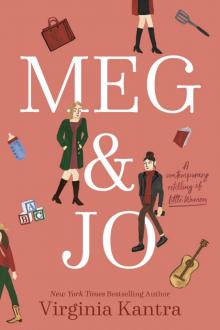 Meg and Jo
Meg and Jo All a Man Can Do
All a Man Can Do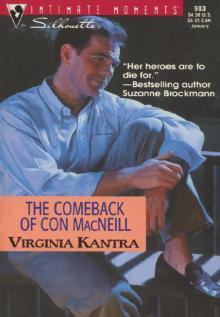 THE COMEBACK OF CON MACNEILL
THE COMEBACK OF CON MACNEILL All a Man Can Be
All a Man Can Be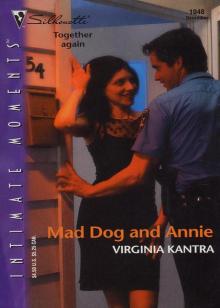 MAD DOG AND ANNIE
MAD DOG AND ANNIE![Dare Island [2] Carolina Girl Read online](http://i1.bookreadfree.com/i/03/26/dare_island_2_carolina_girl_preview.jpg) Dare Island [2] Carolina Girl
Dare Island [2] Carolina Girl Forgotten Sea
Forgotten Sea Sea Lord
Sea Lord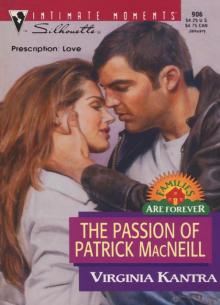 THE PASSION OF PARICK MACNEILL
THE PASSION OF PARICK MACNEILL All a Man Can Ask
All a Man Can Ask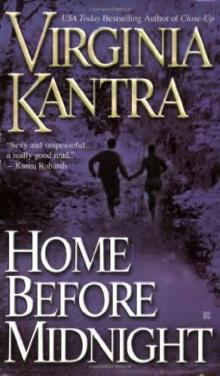 Home Before Midnight
Home Before Midnight Family Secrets: Books 5-8
Family Secrets: Books 5-8 Carolina Dreaming: A Dare Island Novel
Carolina Dreaming: A Dare Island Novel Carolina Home
Carolina Home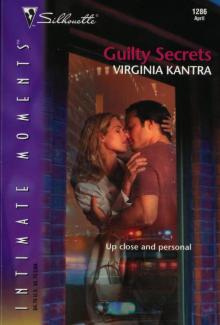 GUILTY SECRETS
GUILTY SECRETS Carolina Blues
Carolina Blues Carolina Man
Carolina Man Carolina Man (A Dare Island Novel)
Carolina Man (A Dare Island Novel) STOLEN MEMORY
STOLEN MEMORY Carolina Heart
Carolina Heart Immortal Sea
Immortal Sea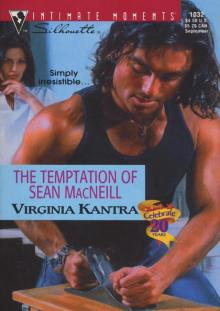 THE TEMPTATION OF SEAN MCNEILL
THE TEMPTATION OF SEAN MCNEILL Sea Fever
Sea Fever